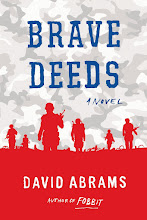My interview with Malcolm Brooks is up over at The Barnes & Noble Review and I encourage you to go over there and read what he has to say about writing, busting the myths of western literature, and being inspired by the U.S. Army's last horse cavalry unit.
Here's part of what I wrote by way of introduction to Malcolm and Painted Horses:
It comes as little surprise to learn that Lonesome Dove is a seminal literary influence in Malcolm Brooks’s life. Reading his debut novel, Painted Horses, you’ll hear the voice of Larry McMurtry, as well as echoes of Jim Harrison, Wallace Stegner, and that old go-to, Cormac McCarthy. But make no mistake, Malcolm Brooks stands on his own without leaning on the crutches of those other seasoned writers. Painted Horses — which is a Barnes & Noble Discover Great New Writers selection and a No. 1 Indie Next Pick for August — is unlike any “western” I’ve read; it refreshes the genre while nodding back at its roots.As with any published interview, there were some good snippets of conversation which didn't make the final cut. Today, I thought I'd randomly pick a few of those scraps up off the cutting-room floor and share them with you here at The Quivering Pen:
Set in Montana in the mid-1950s, the novel presents us with an American West on the cusp of change. Catherine Lemay is a young archaeologist hired to survey a canyon in advance of a major dam project; her job is to make sure nothing of historic value will be lost in the coming flood. The task proves to be more complicated than she thought — especially after she meets John H, a mustanger and a veteran of the U.S. Army’s last mounted cavalry campaign, who’s been living a fugitive life in the canyon. Together, the two race against time to save the past before it is destroyed by an industry with an eye on the future.
From the very first scene of Painted Horses, you introduce some complex ideas about progress versus the dying ways of the past--you have Catherine riding a train into Montana and looking out the window at an "utterly alien species" racing alongside. You write: "[She had] anticipated the general vista of a cowboy movie. Red mesas and towering sandstone spires. Minuscule horsemen galloping." Where do you place Catherine, the archaeologist, along this historical timeline?
Life is paradox, and I believe we’re all creatures of supreme duality. Catherine struggles constantly with the expectations and sort of soulless strictures of a hard science, and conforming to those as a function of professionalism, while in her heart remaining utterly seduced by the mystery and magic and beauty of buried remnants. Part of her wants to be Mr. Spock, but at heart she’s a Romantic poet.
 |
| Malcolm Brooks on book tour at Country Bookshelf in Bozeman, Montana (and, yes, there was more than just one person in the audience that night) |
For me, some of the most startling and, frankly, distressing scenes were the ones involving blatant male chauvinism. As a man, were these scenes hard for you to write?
They weren’t hard for me to write at all. I come out of an extremely conservative evangelical subculture, and have worked in the building trades for more than two decades. I’ve heard it all, and it’s basic mimicry. I’ve also had the great pleasure of knowing and associating with more than a few passionate, driven, accomplished women, none of whom let something as toothless as male bluster or condescension stop them.
What brought you to Montana?
A couple of things, really. I had this mythical sense of the state from the time I was a little kid. I was a huge fan of westerns and horses and all of that. It’s part of my core identity. Montana was this mythical place for me and it was solidified when I read Lonesome Dove. And then I read A River Runs Through It and Legends of the Fall before I ever moved here. I knew the University of Montana had a great MFA program and that Missoula was a writer-centric place. When I went to finish my English degree, I thought, That’s where I want to go. I like to fly-fish, too. So this is where I wound up when I was 24. I’d worked for my dad for six years out of high school. Then I moved around to Phoenix, northeastern Oregon, and in the early 90s I was up in Kalispell (Montana), working on a house-building crew for six months. I’d lived in various places, but always wound up going back home to California again and just putting on the tool belt and working some more for my dad. My father was a carpenter most of his life—he joined his first union when he was nineteen. He was the kind of guy where if he needed more people on a concrete pour when I was in high school, I wouldn’t go to school that day. It taught me there’s more than one way to get an education.
 |
| Malcolm Brooks on the job in Missoula, Montana |
You mentioned your family was pretty strict in the religious sense.
My parents went from being long-hair, pseudo-counter-culture people to where my dad’s hair was cut into a high-and-tight and he was a 28-year-old deacon. My father had been raised in the New Jersey foster care system and the primary foster parent he had at a formative time was a preacher. So he always had a real sense for Christianity, that was his default setting. Once they had kids, my parents just went way into religion. It wasn’t mainline Christianity; it was a Baptist sect that was kind of cult-y, out of a Southern Baptist tradition—the crazy ones that were off burning Beatles records because of some off-hand comment John Lennon made. That Beatles thing happened about six years before my parents went all total-immersion into it. They got with this pretty intense Baptist church. The nadir—or apogee, depending on how you want to look at it—came when someone predicted the Second Coming of Christ, based on mathematics and Biblical prophecy. The church we were going to had totally fallen for this. It was going to be X Day at X Time in 1980. On that day, we stood around in the back yard at the appointed time and held hands in a circle and waited for the Second Coming.
Were you snickering or rolling your eyes at the whole thing?
At the time, no—I totally bought into it. I was nine years old and I’d been completed immersed in this whole subculture from the time I was three years old. I didn’t know any different. To me, that was reality. We were totally sheltered. Part of the reason why I’m such a sponge for pop culture today is because my brothers and I were totally kept from it. We lived in this little sensory-deprivation chamber.
Before the big conversion moment with my parents—back when they were still living a somewhat normal life—my dad had a massive record collection—he was a huge Beatles fan, along with The Doors and Blood, Sweat and Tears. When I was really little, my mom said she would put me on a hobby horse—you know, the kind with the springs on it—in front of my dad’s huge stereo system, which included a reel-to-reel tape player, and she’d put on a Doors album. While she was doing her thing cleaning the house, I’d be in front of this huge speaker on a hobby horse.
You were on horses even way back then.
Yeah, exactly. I think all that music got fixed in my psyche somehow. Later, when my parents joined the church, they did a cleansing and all those records went away—but my father kept them, he had them boxed up in the basement. I think he really missed the music…because when Bob Dylan converted to Christianity, the first thing my dad did was rush out and buy Slow Train Coming and I can remember sitting in a rocking chair listening to that album, which was real rock-n-roll which also had a message behind it.
Can you pinpoint when you broke free of all that religious conservatism?
I was always writing back then—westerns or English-style mysteries. I had an escapist streak as a kid. I remember reading The Winds of War in the eighth grade because the mini-series was on TV—oh, that's another story. My parents didn’t have a TV for years. Right around the time when I was 11 or 12, I think my dad wanted to watch the World Series, so my parents knuckled down and bought a TV set. The only way you could get reception was if you had cable. So we went from nothing to everything. Both my parents were working at that time, so my whole equation shifted. I was in the perfect place at the perfect time because I was a total sponge for things like Hitchcock films and Marilyn Monroe and all kinds of stuff. I just absorbed it and fast. My parents and I sat and watched The Winds of War together. I think they must have probably been missing some stimulation themselves, and they probably rationalized letting us watch TV it by saying it was historical and it had to do with wars and stuff. So then I got the book and I read it. But I was also reading Louis L’Amour westerns and Agatha Christie mysteries.
I was in Christian schools all the way up until I was in eighth grade. So eighth grade was the first time I was in a public school….and that’s when my English teacher gave me Lonesome Dove. She gave it to me at the end of June as an eighth-grade graduation gift. She called my house and told my mom, “Look, I know this is an adult novel, and it’s not written for children but your son is not a child as a reader and I think this book will change his life.” And she was right.














No comments:
Post a Comment